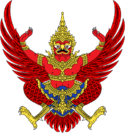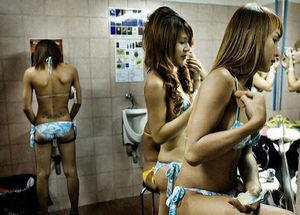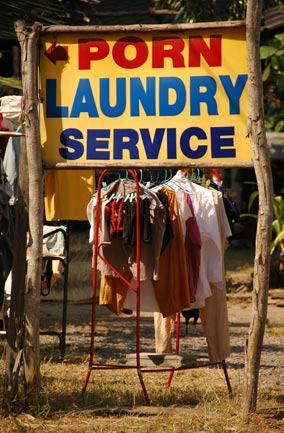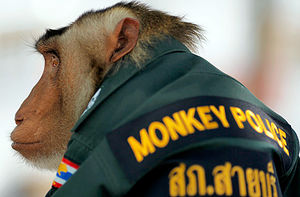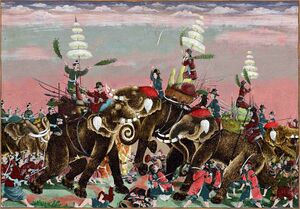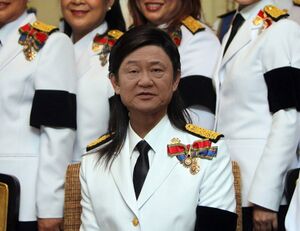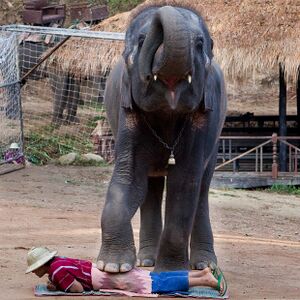Thailand
“Experience is the name we give our mistakes, because we can’t pronounce any of their Thai names.”
ฉันสามารถเขียนอะไรที่ฉันต้องการและไม่มีใครจะเข้าใจ We are no longer Siamese if you please. Kingdom of Thailand | |||||
|---|---|---|---|---|---|
| |||||
| Anthem: "One Night in Bangkok" | |||||
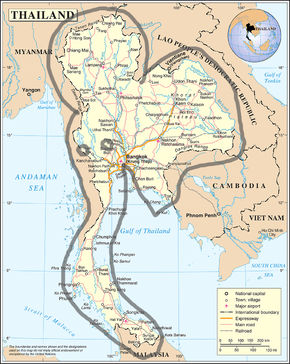 | |||||
| Capital | Bangkok, appropriately | ||||
| Largest city | Bangkok swallowed all the other cities, appropriately. | ||||
| Official language(s) | Thai English with no last consonants | ||||
| Government | The organs of state are constantly being changed, so representative of most Thais. | ||||
| ‑ Monarch | Referred to as Rama #9 | ||||
| ‑ Prime minister | Referred to as Inmate #9 | ||||
| Cuisine | Midway between Indian, Chinese and the nearest toilet. | ||||
| Declaration of Independence | Only ever colonized by 7/11 | ||||
| Currency | Baht (no relation to Homer) | ||||
| Religion | Buddhismi All the things Buddhism preaches against | ||||
| Population | 66 million (roughly US$200 to have them all for one night) | ||||
| Population density | Not as thick as the tourists | ||||
| Major exports | Cheap hard-drives, cheap cameras and cheap sex | ||||
| Major imports | People looking to combine those three exports, legally or illegally | ||||
The only nation in South-East Asia not colonized by foreigners, Thailand has become the South-East Asian nation most visited by foreigners. Maybe that's proof you always want what you can't have. Or maybe that's proof the foreign powers didn't go to the right chain-smoking tuk-tuk driver to get what they wanted.
The popularity of Thailand is a result of offering the best of Asian culture, just with the knob turned up to 11. The same long imperial history as China, except played out on tropical beaches and bays you'd pawn your kidney to set foot on; The same convoluted bureaucracy as Korea, except you can cut through the Thai version with the simple act of reaching for your back pocket; The same absence of moral decency as Japan, except available for pocket change.
Etymology
The country was once referred to as Siam, however a breed of cat got hold of the name and everyone knows how difficult it is to get something back off a frisky kitten. The name of the country was changed to Thailand in 1939 to avoid a confrontation with the cats after they started hissing and doing that bushy-tail thing.
Thailand is derived from the word Thai (ไทย), which either means "human" or "independence". Hence Thailand is "Human-land", as opposed to your school or place of work, which would be "Inhuman-land" due to all your peers acting out those fake social personas and maintaining the pretense they aren't actually thinking about lying on powdery sand and inhaling another powdery substance off the bare skin of a Thai.
Demographics
Over 95% of Thailand residents claim to be ethnic Thai. This is no surprise; you're unlikely to see many non-Disney characters popping up in Disneyland for example. Given Bugs Bunny's penchant for cross-dressing you may see him pop up in Thailand, though.
As always in Thailand, the claims should be taken with a grain of salt and a peek under the skirt; roughly one third of Thais have Lao ancestry, one sixth have Chinese heritage, and one ninth are descended from a particularly careless Arkansas private on a two-week R&R break in the 1960s. Other significant minorities include; Cambodians, who can be found any place with vile stinking fish sauce; Burmese, who can be found any place with vile stinking human rights violations; and indigenous hill tribes, who have embraced modernity and shifted from a hunter-gatherer lifestyle to a hawker-gatherer lifestyle.
Nationalist pressures have created a sense of shared Thai identity, and the diverse populace coexists smoothly, working together, playing together and tailgating each other with no distinction for ethnicity.
Culture

To the outside observer the Thai mentality towards life may appear a lot like, well, mentality. However, the Thai habit of flashing a smile when confronted by challenges, disagreements or several generations of illegitimate offspring has won many plaudits and Thailand is often referred to as the Land of Smiles. Grinning is practically the national sport – at least for as long as the IOC classifies Muay Thai kickboxing as closer to war crimes than a sport – and young Thai children are put through grueling daily training by European backpackers searching for the perfect smile to grace their Instagram account.
When a Thai stops smiling it is typically referred to as a "loss of face", although a Thai may "lose face" without changing expression in the slightest if they have recently visited one of the numerous back-alley plastic-surgery clinics found in Bangkok. Causing a Thai to lose face is a dangerous thing, and it may cause a "loss of head" if you happen to have offended a Thai in a position of power or a Thai in possession of a particularly vicious buffalo. It is normal to praise a Thai first before making a request for a change to their work; however, praising them, baking them a cake, reuniting them with a beloved and long-lost relative, convincing their favorite band to perform a private show for the pair, and producing an Oscar winning documentary about the event is pretty much the only sure-fire way to ensure your criticism won't be met with offense.
Enlighten me

There are two main religions in Thailand.
- The first – Theravada Buddhism – seeks to guide its practitioners towards enlightenment by emptying the mind of all delusions of the self.
- If that fails, the second – Muay Thai – will empty the brain cavity of everything else.
Ashoka the Great is reputed to have been the first to bring Buddhism to Thailand when he sent a caravan of high monks accompanying holy books and a few samples of the substance that made them "high monks". Unfortunately, royal caravans make perfect targets for marauding bandits and the high monks were forced to improvise a new form of martial arts to stop all that marauding.
Buddhism has since left its mark all across the nation in the form of pointy temples full of teenage novices who dress only in robes, while Muay Thai has left its mark all across the nation in the form of padded rings full of teenage novices who dress only in boxer shorts. No Thai town is complete without one (or ten) of either, and a clinic-come-crematorium to deal with the inevitable outcome of all that fasting and sparring.
All Thai families are expected, if not obligated, to contribute a member to briefly serve as a renunciate; named so because the novices (เณร) and monks (ภิกษุ) renounce all possessions, which is why they beat you up with their feet rather than anything exotic like nunchuks. Regular, non-renunciate Thais frequently attend the temples for blessing by the Buddha; a typical process would include lighting an incense stick in the temple for good fortune, visiting the local kickboxing ring, and then returning to light an angrily-worded incense stick if their chosen fighter fails to pay out.
The King and you
The mere existence of the royal family provides every Thai with more than three weeks' worth[1] of public holidays each year, so the Monarchy remains popular[2] among all sectors of Thai society.
Administrative divisions
| Map | Bangkok |
|---|---|
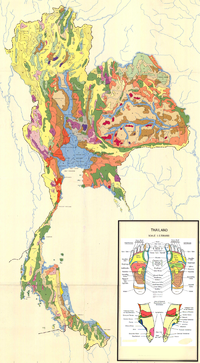 Some Thai masseuses claim manipulating certain parts of the foot will transport the client to different areas of the country. Remarking that they are just "pulling your leg" will, however, transport you to the emergency wards of the country. Some Thai masseuses claim manipulating certain parts of the foot will transport the client to different areas of the country. Remarking that they are just "pulling your leg" will, however, transport you to the emergency wards of the country.
|
If New York is the "Big Apple" then Bangkok has gone one better and become the "Big Jam". The city is probably the finest place in South East Asia to witness the rise of Eastern economies and contribute more than a little economic growth of your own as your taxi meter ticks over while jammed behind a pensioner pushing a cart of fried insects.
Home to Asia's largest financial services industry, Bangkok cultivates a unique river ecosystem of Thai businessmen, Indian tailors making suits for Thai businessmen, and Laotian sex workers removing suits from Thai businessmen. The Chao Phraya river itself is noisy, smelly and filled with junk, making it equal with the best markets in the region. While Pattaya is a place for sex, Bangkok is a place to do pornography because ... you know ... the name. |
| East | |
| Pattaya (formerly, St. Pattayasburg) was once reputed to be so unlawful and degenerate it made the old Sin City comics look like See Spot Run. However, in recent years the city has made an effort to clean up and the most experienced sex workers have long since retired to elementary school.
Pattaya was founded by the goddess of sex, Aphrodite. She had sex with Ares, the god of war and this is how to city was born. In 1790, the city was a Russian colony called St. Pattayasburg. That's why there are so many Russians in the city. In 1950, figuring that Russia was now communist, Thailand decided to take the city in a war. The area is now the favorite holiday destination for a significant number of Russians (both colonial and tourists), creating suggestions that it may be Putin's next target for annexation. The large population of militant ladyboys may put a dampener on[3][4] the President's imperial ambition. Due to the leaked plans of Putin's annexation, the Thais got mad and changed the city's name from St. Pattayasburg to Pattaya in 2015. This has not stopped Russian tourists and even Putin from coming. This city contributes a lot to the Thai economy, producing over US$100 billion in 2020 despite Covid-19. This is due to illegal immigration to Thailand for sex, gender changes, and tourism. The city boasts 80% of all sexual research in its university called The University of Pattaya. There is also a gender-changing machine. (For only $100, and you can keep your facial appearance.) | |
| South | |
| The region featuring Phuket, Krabi, Ko Samui, and other names you've chuckled at in travel brochures, is blessed with tropical islands so numerous it would make a band of pirates cry and sand so white it would make a band of KKK members cry. Once dependent on catching tropical fish to cook on the beach, the economy of the region is now devoted to catching foreign travelers to cook on the beach.
The vast majority of the world's travel agents are kept out of the world's unemployment queues by virtue of glossy magazine spreads documenting this region in photographs so detailed you could catch dengue fever if you put your face too close. Phang Nga Bay is home to 67 islands alone; the largest is a 10,000-tonne limestone islet, however the patrons of the nearby beach bar are only a few "happy hours" away from overtaking it. | |
| North West | |
| Chaing Mai is Thailand for those who are too mature to imbibe substances and lie around on beaches in a daze. They imbibe substances and lie around in forests instead.
The region is reputed to be the spiritual mecca of the nation, and the concentration of temples has been known to accelerate people from zero to Nirvana in under 3.1 seconds. Keep in mind the area is quite conservative and wearing revealing clothing inside a temple may be met with extreme non-violence. | |
| North East | |
| Thailand minus the beaches, forests, islands, tourists and dentists. Basically a side of steamed rice without the main course, this is probably a place to avoid unless your face proudly decorates a police bulletin board somewhere. |
Economy
Thailand is classed as a developing economy, although the foreign businesses that have penetrated her markets prefer the term middle income, which comes with fewer negative connotations and less scrutiny of their browsing history. The gross domestic product (GDP) of the country is US$366 billion (roughly equal to the amount you'll be quoted by any tuk-tuk driver for a ride to the closest bus station), and the GDP per capita is approximately $5,300 – increasing at a rate of $30 per hour for every Western retiree they meet.
The largest Thai industry is manufacturing small cars for malnourished Asians about four feet high, closely followed by manufacturing small clothing for malnourished Asians about four feet high. Tourism is next, and the most common export type from this sector is black-market DVDs featuring malnourished Asians about four feet high, but definitely not featuring cars or clothing of any size.
Finally comes the agricultural sector, which employs the auntie and uncle of every Thai and is constantly one buffalo away from failure. The reason why most Thais are malnourished Asians about four feet high is glutinous rice; called glutinous in the sense of being white and sticky, and not in the sense of containing the substance celebrity diets are currently moaning about. Apparently the world loves things that are white, sticky and regularly consumed by Thais, because Thailand was the largest rice exporter in the world until 2011, when the aforementioned celebrity diets dropped Thai stir-fry in favor of consuming Somalian babies.
- Outlook from Standard & Poor's Standards are projected to remain poor, particularly among foreign expats.
- Outlook from Moody's Moodiness is predicted to rise, particularly among Thai women married to foreign expats.
- Ease-of-doing-business ranked 18th
- Ease-of-doing-business-on-someone's-chest ranked 1st
Geography
Thailand is surrounded on all four sides by nations that boast the same pristine beaches, the same lush rain-forests and the same amoebic dysentery (not physically the same though, as they aren't nearly Jewish enough to be accused of land grabbing conspiracies).
However Burma, Cambodia, Laos and Malaysia are all carrying more unwanted baggage than the residents of Bangkok central prison combined. The United States Military violated a young Cambodia and Laos, leaving them with a bad case of PTSD and a million-yard stare that makes driving there even more dangerous than Thailand. A young Burma developed a personality disorder and still doesn't know whether it's a strong-man military junta, a rag-tag group working together despite their differences, or a bunch of extras in a forthcoming movie about Aung San Suu Kyi. Finally, the British had a fairly cordial relationship with the young Malaysia, but no one better tell her Islamic forefathers about that relationship because they seem to do very foolhardy things when it comes to youthful intermingling. Dealing with any of the four neighbours can best be described as "it's complicated", while the only thing that comes with complications in Thailand is an unsightly rash.
Countrywide, temperatures normally range from an average annual high of 38 °C (100.4 °F, or "burned alive" in the view of European visitors) to a low of 19 °C (66.2 °F, or "frozen alive" in the view of Thai natives).
History
An archaeological site in Lampang, northern Thailand, discovered the remains of a one-million-year-old Homo erectus, believed to be the first Thai resident and the last Thai resident to have followed the road rules.
The Thai people themselves migrated south from Yunnan in the 10th century after losing a cooking competition to the Chinese. Here they encountered several indigenous Mon-Khmer and Malay civilizations, who they easily beat in another cooking competition because they didn't put too much chili sauce in it this time.
Just in case anyone thought that sounded a little weak, the Thais made sure to raid the Khmer city of Angkor and get themselves in ample carvings of people impaling and being impaled. In the stonework of Angkor Wat, Thai forces can be identified as the men wearing fancy skirts and riding elephants that are stomping people into a thick paste; a scene that will be recreated if you ever happen to interrupt a karaoke session at a Thai bar.
Can't Thai us down
The Mon-Khmer and Malay civilizations gradually learned to avoid Thailand – or at least get some shots before visiting – and the Thais carved out their first empire during the 13th century, the kingdom of Sukhothai.[5]
In a unique political feature, every Sukhothai citizen could bring their problems directly to the king by ringing bell in front of the palace; Thai historians call this model father governs children, as the king would be asleep in a hammock, be awoken by the bell, spill his beverage, mutter obscenities at the citizen and direct them to his wife who "usually deals with that kind of thing". The one exception was King Ramkamhaeng, who was rather into DIY work and both hammered out the Thai alphabet and established Buddhism as the state religion. He also enjoyed trading Song Dynasty pottery, and was open to a Mon-Khmer ruler eloping with his daughter, so you can only imagine what he got up to on business trips to Bangkok (sorry ladies).
Unfortunately, later Sukhothai kings discovered ear-plugs and returned to the hammock. The disaffected Sukhothai tributary states spent their tribute money on fancy skirts and rode off on their elephants to stomp more people into a thick paste.
Go big or go home
As one kingdom found itself penniless, alone and willing to pawn its kidneys on the Thai streets, another came to take its place in the sun. The Kingdom of Ayutthaya sounded more like a heavy sneeze than a double entendre, however it was the first Thai kingdom to "go the extra mile" to attract foreign visitors.
Beginning with arrival of the Portuguese Duarte Fernandes in 1511 the Europeans subtly tried to kill off the local Ayutthaya inhabitants with disease, as they usually did. The twin institutions of the sloppy street stall pad thai and the sloppy street walking ladyboy had granted the kingdom an impressive resistance to pathogens, and the Europeans put away their imperial ambitions and began trading more acceptable things like rice, sugar and human beings.
The Ayutthaya sphere of power grew to include areas as far South as the Malay peninsula and as far East as Vietnam, or roughly a billion deck chairs worth of coastline. The capital itself swelled to a population of more than a million, becoming the largest city in the world at the time; this was rather distressing for the European sailors who sailed to Asia for some primitive fun, only to find the locals had something bigger than what the Europeans had.
However, in the 18th century, the Burmese invaded the kingdom and sacked the capital after a dispute over a mini-bar bill. While on the run, the final Ayutthaya king succumbed to starvation after his room service request went unanswered.
More than one night in Bangkok
In 1767 the seat of Thai power then moved to Thonburi, short for Thonburied Treasure, which is what the General Taksin believed could be found in the region. Unfortunately, Taksin also believed he was the Buddha reincarnate, that his heir-presumptive was plotting against him, and that smoked squid made a good snack. Clearly mad, he had the whole court imprisoned, flogged, interrogated and coated in soy sauce; in 1782 Taksin was deposed by General Chakri moments before he could smoke the whole nation. Chakri (later named Rama I) had already been the defacto ruler of the kingdom for the better part of the decade and was well on his way to elevating the city into the global consciousness, which he did by giving it the funniest name ever; Bangkok.
Unfortunately, the start of the 19th century coincided with the French chewing through Vietnam like a crusty baguette and the British making lunch of Burma. Thai seemed like it would be the next dish on the menu. However, the one weakness every Western man shares is a weakness for the charms of a Thai. The Thais first signed the Burney Treaty with the British, quickly followed by the Roberts Treaty with the United States (updated no less than three times), before the British returned again for the Anglo-Siamese Treaty. The Thais were even forced to sign a treaty with an industrial cleaning company to steam clean the nation's sheets after all that negotiating.
Into the 20th century, Thailand remained proudly 100% Thai-owned – in the sense that it was pretty much owned, 100%, by one proud Thai: the absolute monarch. However, the influence of the Western powers had forced the kingdom to modernize by teaching people how to read and no longer teaching them how to crush things with elephants. The military – who could now say more than "Stamp on him, Stampy!" – had emerged as a real threat to the monarchy by virtue of having cannons, which were more than a match for the really pointy hats the Thai kings had traditionally been armed with (see image).
Checkmate
With their new found education, the Thai people reasoned they could rule better than any old chakravartin king hand picked by the Buddha. Throughout the 20th century they have proven this by selecting, electing and then ousting prime ministers at a rate so great every Thai will have been head of state at least twice by 2050.
On the night of 23 June 1932, a dissident group of the Thai soldiers descended upon the royal palace, creating much confusion and speculation as to whether there was a communist uprising or if Indiana Jones had come to steal all their ancient artifacts. Military exercises were common, and unannounced ones after a particularly good muay thai bout were even more common, so Rama VII initially doubted whether the constitution presented in front of him at 3am was anything more than a petition to lower the price of Singha at the local beer gardens. However, armored cars had been positioned, hostages had been taken, and a fluffy little stray dog had widdled on the royal wagon, so the monarch signed away all his ancient powers to veto laws, to pardon criminals, to choose his successor, and to not be ripped of by Phuket taxi drivers, in order to prevent blood (and more urine) being shed.
An agreement later that year gave the monarchy back the powers of earth, fire, wind, water, and heart. However, these were pretty useless without a friendly captain and the only one of those nearby, Captain Plaek Phibunsongkhram, was trying to glue his ridiculously long name tag on the office of head of state. Plaek steered the nation through World War II, and even managed to save Thailand from Japanese invasion by deploying a battalion of soldiers who fired projectiles from a very unique part of the anatomy. Out of respect for leading Thailand through the hard times, Plaek was subject to only four coup attempts.
Coup tycoon
The longest serving democratically elected prime minister was Thaksin Shinawatra who served in Thailand from 2001 to 2006, and on a London tennis court from 2006 onwards. Already stinking rich as a result of owning ThaiCom, the satellite company that provides those drama series that are like crack to Asian mothers, Thaksin entered politics for the Thai Rak Thai ("Thais Love Thais"), the only political party ever named after an online dating service.
After winning a landslide election in 2001, he then managed to misunderstand the concept of "love" by having every addict (aside from the Asian mothers) shot to death, and then again by loading peaceful Muslim protesters into the trucks of the most gaseous police in the kingdom, thereby suffocating the protesters and initiating a religious conflict.
Supporters pointed to the time he abused his power to help his wife obtain public land as evidence he does love some Thais, however Thaksin was still deposed in 2006 by the military when it emerged he had fraudulently received US$500 million in cash and property which was, frankly, disgracefully low by Thai standards.
Thaksin briefly returned to power between 2011 and 2014, disguised as a woman under the alias Yingluck Shinawatra, at least until someone noticed the Adam's apple and his wig fell off.
Government
Thankfully it changes every three minutes, so there's no point explaining it. So here's another elephant instead.
Notes
- ↑ The King's birthday, his graduation from potty training, his first day of kindergarten ...
- ↑ The slightest criticism is met with prison time if not the heavy end of an elephant.
- ↑ recte "put a damper on", or "dampen" it
- ↑ Oh, you meant ... gimmee that sponge.
- ↑ Suk-ho-thai? They really brought those stereotypes upon themselves.

